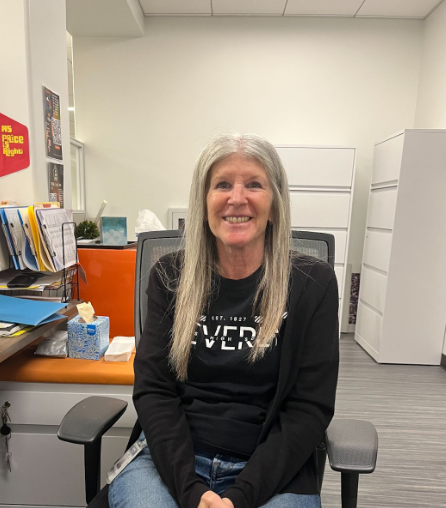Lauren Hannani culture editor
Club flyers: they’re everywhere. Whether the meetings involve raising money for a cause or watching anime during lunch, there seems to be a club for almost every kind of hobby or interest. Club Day is one of the most crowded events of the year, bringing together over 115 clubs and countless students every year. However, that day is only the beginning of each club’s unique experiences in discovering their own interpretation of club victory.
Inheriting an institution
DECA is one of the biggest clubs at the school, with over 115 members this year. However, it is also one of the oldest clubs on campus, which has continued to contribute to its popularity over the years.
“It’s given us a chance to grow on previous years’ experiences,” club president Sean Toobi said. “This allows us to make changes to the program, initiate new activities, and bring in tons of alumni that come back to teach what they have learned.”
However, according to Toobi, DECA’s success is not only due to its long existence at the school, but also to the club’s many opportunities for a variety of students.
“For one thing, we’re continuing to increase our membership year by year. I believe this is due to the fact that DECA can provide opportunities in numerous fields, leaving it open to students of all interests,” Toobi said. “Also, we are becoming more successful in competition, with more and more members winning awards in their categories.”
Even with the club’s growing success, its board still feels a need to advertise and promote DECA as much as possible.
“Despite the fact that we’re already a large club, that doesn’t mean there isn’t room to grow,” Toobi said. “From a business standpoint, growth is always a key to success, so we’re always looking to continue expanding and doing new things.”
Success at first trial
While some successful clubs have been around for a while, others have only recently been founded. One of these clubs, Mock Trial, did not find it difficult to recruit members since starting a year ago.
“I basically told a group of my close friends how cool the club would be, and that we only needed at least eight people, and they ended up sticking around,” club president Liza Freiberg said. “First year we had 13 people in the club, this year we have around 25 members.”
Freiberg thinks that her club has been able to stay popular and attract many students because of a combination of two things: college resume value and word of mouth.
“It’s so competitive to get into college, and students are attracted to Mock Trial because it’s definitely a club that involves a great time commitment, so it’ll look more impressive on a college app,” Freiberg said. “Also, the people who are in Mock Trial are always talking about their experience in classrooms and in the halls, so it’s no coincidence that people overhear and want to be part of the club.”
In fact, spreading word about the club, online and in person, is still happening for Mock Trial club members.
“We had awesome pictures on social media and had flyers going last year, and both this year and last year we had ads in the bulletin,” Freiberg said. “We also talked to every period of the theater class last year.”
In order to ensure the club’s success in the future, Freiberg will not be losing contact with the club even after she graduates.
“Hopefully I’ll be able to continue Mock Trial in college, so I’ll keep in touch [with my team at high school] and give [them] new info,” Freiberg said.
Awareness of failure brings awareness of mind
Not all clubs start with a large group of members. For senior Maya Luong, it took more than one try to finally feel confident about her club.
“The easy thing is getting people to give you their name and email, the hard part is getting them to actually come through and get active,” Luong said. “Through my experience last year, I just learned that some clubs are just meant to be small because of its specific nature and the number of people interested.”
Luong created the Law and Business club last year, but due to a lack of club participation, she decided to not continue the club this year.
“I felt like there was so little I could do, because I was successful in getting guest speakers for the club, but people were just not interested,” she said. “So at one point I just realized it’s not on me.”
Instead, Luong has taken charge of a different club: BFAM (Beverly for Awareness of Mind). And this time, she approached it with a different mindset.
“I knew that a lot of people would sign up but only three to 10 people would really be active,” Luong said. “I focused on longevity rather than numbers, so I would have the meetings be consistently every other week, no matter how many people are coming. And I would just focus on planning activities with the people I know would be active.”
Additionally, the intimacy of the club has become an advantage for Luong this time around.
“It’s been going well, we just finalized our first big project,” Luong said. “It was also a lot less stressful for me because instead of fretting out over how many people are going to come, I can just focus on getting the project done.”
Although it took some time for Luong to figure out why her club had not become successful last year, she is grateful for the experience, as it taught her what she valued the most in these groups.
“I took a lot of time to reflect on why my club did not work out last year and why. But after a while I just realized that my big mistake was that there wasn’t a demand for it and I didn’t realize it,” Luong said. “I think learning the mistake last year helped me a lot in running BFAM this year. You have to fail to learn…sometimes that’s the only way.”
What’s going on with the club system now?
Being a member and leader of various clubs, ASB club commissioner Samantha Boudaie is not foreign to the club system, especially the struggles that come with leading a club on campus. Starting before school began, she has been working on some projects to ensure every student’s satisfaction with clubs on campus–one of them being a website devoted only to clubs.
“You know, clubs were meeting on the same day, people didn’t know about most clubs or what they did…I also found it difficult to find and connect with ASB members to get the help I needed,” Boudaie said. “Because I have a history in website development, I thought creating a convenient website was the perfect idea to ensure a better world for clubs.”
The website includes a full list of the clubs on campus, a calendar of clubs meetings and major events, all of the forms necessary to start and regulate a club, and a complete list of ASB members and their contact information.
“It’s my biggest accomplishment [as club commissioner],” Boudaie said. “While it took a lot of time and diligence, I’ve found it incredibly rewarding.”
Boudaie hopes that this website can also help the club leaders that are having trouble recruiting members or promoting their club.
“Now that there is a way to directly contact ASB members, clubs are encouraged to ask us questions and get ideas,” she said. “We can offer advice as well as assistance as they need it.”
Another issue that Boudaie hopes to fix soon is the funding of clubs, which might be a side effect of the vast variety of groups at school.
“It’s great because students have the ability to find whichever clubs suit them best, but it’s also a problem, since the allotted funds for groups, clubs, and other organizations on campus is limited,” she said. “The more groups on campus, the less money goes to each club. I’ve been working to build on the advantages, while also strategizing ways to fund all clubs.”
Although these tasks have not been easy so far, Boudaie is proud of her work so far as club commissioner. However, there is one factor that she says she has no control over but is crucial to a club’s success: leadership.
“The most successful clubs are the ones with a devoted board, the ones with students pushing for a higher level of involvement…the clubs with the president telling all the classes that there’s a meeting that day, or the ones making events on Facebook for students to see,” Boudaie said. “It’s about how one person, or a group, is marketing the club. That’s really the key.”
Read about how “Free food shouldn’t be offered by clubs as incentive for organizing meetings“.
Desiree Gonzalez staff writer
Rinesa Kabashi photo editor
Making differences through campus clubs
When it comes to clubs, The Real Estate Club led by Jonathan Meshkani and Daniel Hanasab and Cookies for Cancer led by Ava Hekmati and Jason Mirharooni, make differences throughout the campus.
[youtube https://www.youtube.com/watch?v=E8VXp8qC_4g&w=560&h=315]
Categories:
Clubs work toward success
December 12, 2017
2
0
Tags:
Donate to Highlights
$125
$1000
Contributed
Our Goal
Your donation will support the student journalists of Beverly Hills High School. Your contribution will allow us to purchase equipment and cover our annual website hosting costs.
More to Discover































